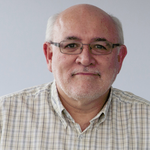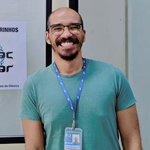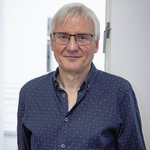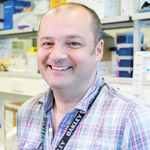Announcing your prize winners 2026 – selected by members for Annual Conference 2026
19 November 2025
The Microbiology Society is pleased to announce the winners of our 2026 Prizes, which will be awarded at Society’s Annual Conference 2026 in Belfast from 13–16 April, where the winners will present their Prize Lectures. The winners are nominated by, and selected by, our membership.
The Microbiology Society’s Prizes recognise excellence and are awarded to those making significant contributions in the field of microbiology, based on nominations received from across the membership. Winners are selected for their work to advance understanding of microbiology and champion the contribution made by microbiology, our members and their work in addressing global challenges.
Prize Medal 2026: Professor Paul Williams

Professor Paul Williams is Professor of Molecular Microbiology, at the Biodiscovery Institute and School of Life Sciences, University of Nottingham, UK.
Professor Williams’ first academic appointment was based in the medicinal chemistry division within School of Pharmacy at the University of Nottingham. It was here that he was persuaded to get involved in a research project to elucidate the biosynthetic pathway to a simple carbapenem antibiotic in the Gram-negative bacterium Erwinia carotovora. This resulted in the unexpected discovery that carbapenem production was controlled by an N-acylhomoserine lactone (AHL). This signal molecule was previously known only as an autoinducer of bioluminescence in marine vibrios. By developing AHL biosensors and strategies for the chemical synthesis of AHLs, Professor Williams and colleagues rapidly established that diverse bacterial species could co-ordinate specific behaviours in a population-dependent manner through cell-to-cell communication – subsequently termed ‘quorum sensing’ (QS).
The work of Paul and his team raised many fundamental questions with respect to the diversity of QS signal molecules, their associated molecular machineries, target regulons and degradation. QS signal molecules in pathogens such as Pseudomonas aeruginosa have emerged as multi-functional agents that impact on host-pathogen interactions and influence life, development and death in single and mixed microbial populations and biofilms. Exploration of the diagnostic and therapeutic potential of QS has offered new pathways to infection management and prevention.
Much of the QS work led by Professor Williams and his team has been multi-disciplinary involving fruitful diverse UK and global collaborations. He has mentored more than one hundred PhD students and postdocs many of whom are now leaders in their own fields. Professor Williams has served on the Medical Research Council UK Infections and Immunity Board, the BBSRC Plants and Microbes panel and on the scientific advisory board of the European Union Joint Programming Initiative on Antimicrobial Resistance. He was a Wellcome Trust Senior Investigator, is a Fellow of the Royal Society of Biology and a member of the European Academy of Microbiology.
Commenting on receiving the Prize Medal 2026, Professor Williams said: “I am thrilled and honoured to receive this very special prize from the Microbiology Society. I’ve greatly valued the huge impact the Society has had on my scientific development and the many special opportunities to interact with, and to be mentored by, some of the very best microbiologists. Scientific progress is very much team effort and I would like to acknowledge the award as wonderful recognition for the many talented and passionate colleagues and collaborators who have worked with me over many years.”
The Prize Medal is awarded to an outstanding microbiologist who is a global leader in their field and whose work has had a far-reaching impact beyond the discipline of microbiology. The recipient is awarded an engraved medal and £1,000 at the Society’s Annual Conference.
Equality, Diversity and Inclusion Prize 2026: Professor Edel Pérez-López, Professor Bruno Francesco Rodrigues de Oliveira, Dr Landon J. Getz, Katie Barnes and Dr Nicholas de Mojana di Cologna

Professor Edel Pérez-López, Professor Bruno Francesco Rodrigues de Oliveira, Dr Landon J. Getz, Katie Barnes and Dr Nicholas de Mojana di Cologna – Pride in Microbiology Network.
Edel Pérez-López (he/him) is an Associate Professor of Phytopathology and Canada Research Chair in Insect Vector Invasions and Emerging Plant Diseases at Université Laval, Canada. He earned his BSc in Biochemistry from the University of Havana, Cuba, and his PhD from Universidad Veracruzana, Mexico. He then completed postdoctoral fellowships at Auburn University, USA and the University of Saskatchewan, Canada. Since joining Université Laval in March 2020, Dr. Pérez-López has led EdeLab, an interdisciplinary program in sustainable plant protection that integrates microbiology, plant biology, and entomology to develop durable solutions for food security.

Bruno Francesco Rodrigues de Oliveira (he/him) is an Assistant Professor or Bacteriology in the Department of Microbiology and Parasitology at the Fluminense Federal University, Niterói, Brazil. He has a Bachelor’s degree in Biomedical Sciences from the Federal University of Goiás and was awarded his PhD in Sciences (Microbiology) from the Federal University of Rio de Janeiro, with part of his project carried out at the University College Cork, Ireland. Following a one-year postdoctoral fellowship at the Federal University of Rio de Janeiro, Dr. de Oliveira founded and launched the Laboratory of Marine Bacteriomes (BacMar), in which his research group focuses on exploring marine host-associated prokaryotic communities under the ecological and biotechnological perspectives, with a focus on the macroalgae holobiont.

Landon J. Getz (he/him) is a Postdoctoral Fellow in the Department of Biochemistry at the University of Toronto, Canada. He earned his PhD at Dalhousie University (Microbiology and Immunology) studying host-pathogen interactions in V. parahaemolyticus. Following, Dr. Getz moved to the University of Toronto to study phage-host biology with Dr. Karen Maxwell. Dr. Getz is fascinated by the many ways that bacteria evade infection by their viral predators, known as phages, and the evolutionary partnership between bacteria and phage that has shaped biology across domains of life. Outside the lab, Dr. Getz is an active political advocate for Queer and Trans people in STEM and is committed to matters of public-policy and science education, having authored a number of commentaries on various subjects.

Katie Barnes (she/hers) is a fifth-year graduate student in the Microbiology Doctoral Training Program at the University of Wisconsin-Madison, USA, in the lab of Dr. Laura Knoll. Katie earned her Bachelor’s degree in Molecular, Cell, and Developmental biology at the University of California, Santa Cruz, USA. A central theme of Katie’s research through her scientific career is host-pathogen interactions. Katie has studied the dynamics between the intracellular microbe, Wolbachia, and human filarial parasites. She is now composing her thesis on the impact of parasitic Toxoplasma gondii infection on arginine metabolism of the host. Outside of the lab, Katie is passionate about science communication with the general public and advocates for science policy in the United States.

Nicholas de Mojana di Cologna (he/him) is a Postdoctoral Associate in the Department of Biological Sciences at the State University of New York, USA. He obtained a Bachelor’s degree in Biological Sciences and a Masters’ degree in Molecular Biology from the University of Brasilia, Brazil, and a PhD in Biomedical Sciences within the Microbiology concentration from the University of Florida, USA. His research interests lie in the intersection between bacterial pathophysiology and protein biochemistry, particularly in the context of oral bacteria involved in dental caries and periodontal diseases.
Commenting on receiving the Equality, Diversity and Inclusion Prize 2026, Edel said: “This Prize for Pride in Microbiology is both affirmation and a call to action. It tells every 2SLGBTQI+ microbiologists: you are seen, you belong, and your future matters.”
Bruno said: “I felt such joy when I received the news on being awarded with the EDI Prize, that I couldn’t even describes in a few words. It amalgamates all our hard work in these first three years and keep us motivated to going forwarded with our main aim: amplifying the voices of LGBTQIA+ microbiologists all around the word.”
Landon commented: “Being awarded the 2026 Equality, Diversity, and Inclusion prize is such an incredibly validating experience, rewarding the blood, sweat, and tears that myself and the rest of the Pride in Microbiology team put into this work! It provides a strong sense moving forward for us that we can and will continue to advocate for 2SLGBTQIA+ microbiologists globally.”
Katie said: “I feel an enormous amount of pride in winning this prize. We continue to serve our 2SLGBTQIA+ community through challenging times, and this award is an affirmation of the importance and impact of that work.”
Nicholas commented: “Receiving this award was a wonderful surprise. We have been working hard on expanding the global Pride in Microbiology Network for the past three years, and having our efforts recognized by the a prestigious organisation such as the Microbiology Society suggests that we are on the right path!”
The Equality, Diversion and Inclusion Prize is awarded annually for good practice in and/or an outstanding contribution to initiatives that promote equality, diversity, and inclusion in the microbiological community and/or widen participation by those from historically marginalised communities by raising awareness of microbiology and inspiring the next generation of microbiologists to pursue microbiology careers. The recipients are awarded £1,000.
Marjory Stephenson Prize 2026: Professor Mark Buttner

Professor Mark Buttner is Emeritus Fellow at the John Innes Centre, Norwich Research Park, UK.
Mark received his degree in Biochemistry at the University of Southampton, UK and his PhD on Streptomyces RNA polymerase with fellow Microbiology Society member Nigel Brown in the Biochemistry department at the University of Bristol, UK. Crediting Steve Halford who supported his work on proteins, he subsequently moved to work with Mervyn Bibb in the Streptomyces group at the John Innes Centre in Norwich in 1985. Mark says: “In that very stimulating environment, I learned a great deal from Mervyn, Keith Chater and David Hopwood, most especially the power of genetics and the need to connect my biochemistry to important biology. After my postdoc, I held independent fellowships from the SERC and the Lister Institute at the John Innes Centre before I was appointed to a permanent position in 1996. I became Head of the Department of Molecular Microbiology in 2012. At the beginning of my career, I mostly studied transcriptional regulation, particularly in Streptomyces stress responses. Subsequently, building on Keith Chater’s earlier work, my lab has focussed on the cell biological processes underpinning Streptomyces sporulation, the master regulators that control these processes, and the regulatory and nucleotide signalling networks that link the two”.
As part of this work, Mark’s lab has pioneered Streptomyces venezuelae as a new model system for the genus. Unlike most Streptomyces species, S. venezuelae sporulates in liquid culture, greatly facilitating the application of global omics techniques and fluorescence time-lapse imaging to the study of morphological differentiation.
Commenting on receiving the Marjory Stephenson Prize 2026, Professor Buttner said: “I have been very fortunate to have had a succession of highly motivated and talented people work in my lab, and they, along with my collaborators, deserve much of the credit for this award. I am honoured to receive the Marjory Stephenson Prize, and I am grateful to the two former postdocs who nominated me and of course to the Microbiology Society itself. As a PhD student, I gave my first public seminar at a Society meeting in Sheffield in 1984, so my links with the Society go all the way back to the beginning of my career!”
The Marjory Stephenson Prize is named after the Society's founding member and former President Marjory Stephenson (1947–1948). The Prize is awarded to an individual who has made exceptional contributions to the discipline of microbiology. The recipient is awarded £1,000.
Translational Microbiology Prize 2026: Professor Alan Parker

Professor Alan Parker is the Head of Solid Cancer and Professor of Translational Virology at Cardiff University, UK, and a Senior Research Leader for Health and Care Research Wales. He studied Genetics at the University of Sheffield, UK, where he first developed an interest in gene therapy as a means to treat disease. This interest deepened following the loss of his mother to cancer, leading him to pursue a PhD at the University of Birmingham under the supervision of Professor Len Seymour, where he developed cancer-specific targeting strategies for non-viral gene delivery.
After completing his PhD, Alan took up a postdoctoral position at King’s College London, before moving to the University of Glasgow in 2005. There, he worked with Professor Andy Baker, initially as a postdoctoral researcher and later as a Royal Society of Edinburgh Personal Research Fellow, developing adenoviral platforms for targeted in vivo delivery.
In 2013, he established his independent research team at Cardiff University, focusing on the development of novel advanced therapies in oncology. Since then, his work has centred on characterising adenoviruses and dissecting the virus-host interactions that govern uptake into healthy cells and tissues - interactions that also underlie pathogenic infections. By precisely defining and genetically modifying these interactions, his team has engineered adenoviral platforms better suited for therapeutic applications.
By combining mutations that reduce off-target uptake with capsid modifications that enhance targeting of malignant cells, his team has developed “precision virotherapies” - engineered viruses optimised for intravenous delivery to tumours. This "Trojan horse" approach holds significant promise in the treatment of solid cancers.
In 2021, Alan additionally became Chief Scientific Officer of Trocept Therapeutics, where he has overseen the translation of the first precision virotherapy developed by his lab into clinical development. This therapy selectively infects carcinomas overexpressing the cancer antigen αvβ6 integrin and has now progressed to first-in-human clinical evaluation.
Commenting on receiving the Translational Microbiology Prize 2026, Professor Parker said: “I’m truly honoured — not to mention incredibly surprised and humbled — to receive the Translational Microbiology Prize for 2026. Since establishing my lab in 2013, I’ve had the privilege of working alongside exceptionally talented and dedicated scientists, both within my team and through inspiring collaborations. This award is a testament to their hard work and shared commitment to impactful research. I’m incredibly proud to accept this award on behalf of the entire team, and I’m deeply grateful to the Microbiology Society for recognising our efforts in translational microbiology.”
The Translational Microbiology Prize is awarded to an individual who has demonstrated an outstanding contribution to translational microbiology. The recipient is awarded £1,000.
Fleming Prize 2026: Professor Antonia Ho

Professor Antonia Ho is a Professor and Honorary Consultant of Infectious Diseases at the MRC-University of Glasgow Centre for Virus Research (CVR), UK, where she leads the Clinical Viral Epidemiology Group.
Professor Ho’s internationally recognised research specialises in respiratory viral infections and emerging pathogens, integrating clinical virology, epidemiology, genomics, and immunology to improve the understanding and management of acute respiratory infections in both high- and low-resource settings.
Professor Ho gained her medical degree at the University of Glasgow, UK and, during her specialty training in Infectious Diseases, undertook a Masters in Epidemiology at the London School of Hygiene and Tropical Medicine. Professor Ho completed a Wellcome Trust Clinical PhD Fellowship through the University of Liverpool, UK and the Malawi-Liverpool-Wellcome Trust Clinical Research Programme in 2016, investigating the impact of HIV infection on the burden and severity of influenza illness in adults in Malawi.
Since joining the CVR in 2018, her research has expanded to incorporate CVR’s basic virology expertise, thereby bridging fundamental science and clinical application to address emerging virological challenges. Her work during the COVID-19 pandemic shaped national and international responses. She co-developed the widely adopted 4C mortality score, now embedded in UK and WHO clinical guidelines, and led a longitudinal SARS-CoV-2 sero-surveillance study in Malawi, guiding vaccine prioritisation in resource-limited settings. Professor Ho was awarded the MRF Emerging Leader Prize in 2021 in recognition of her outstanding contributions to COVID-19 research.
Professor Ho continues to play a pivotal role in national resilience to viral threats, holding significant collaborations and advisory roles within ISARIC UK, Public Health Scotland and the World Health Organisation. Her recent research uncovered the viral cause of a global outbreak of severe paediatric hepatitis, identifying co-infection with adenovirus and adeno-associated virus 2 (AAV2) in genetically susceptible children—a world-first discovery published in Nature and now influencing NHS testing protocols. Professor Ho is also deeply committed to mentoring early-career researchers, improving research culture, and engaging with the public—frequently appearing on radio and television as a trusted voice in infectious diseases.
Commenting on receiving the Fleming Prize 2026, Professor Ho said: “I am proud and deeply honoured to receive the Fleming Prize, particularly as Sir Alexander Fleming (a fellow Scot!) made one of the most important scientific discoveries of our lifetime. This award is not just for me; it’s a recognition of the incredible colleagues and collaborators I’ve had the privilege to work with over the past 13 years. I am also thankful for the opportunity to shine a light on clinician scientists. It’s a career path that demands flexibility and resilience, navigating between the demands of clinical and academic work. Our contributions are vital in tackling health challenges of national and global concern. I hope this encourages others to pursue and support this unique and worthwhile role in science and medicine.”
The Fleming Prize is named after Sir Alexander Fleming, founder and first President (1945–1947) of the Microbiology Society, then named the Society for General Microbiology, and is awarded to an early career researcher who has achieved an outstanding research record. The recipient is awarded £1,000.
Outreach and Engagement Prize 2026: Dr Lindsay Broadbent

Dr Lindsay Broadbent is Lecturer in Virology at the School of Biosciences, University of Surrey, UK. She joined the Department in July 2022 following a Wellcome Trust Institutional Strategic Support Fund Fellowship at the WellcomeWolfson Institute for Experimental Medicine, Queen’s University Belfast, UK.
Her research centres on respiratory virus–host interactions, particularly exploring how respiratory virus infection and innate immune responses can lead to longer-term lung damage. Dr Broadbent serves as Programme Director for Microbiology and Postgraduate Research Director for the Discipline of Microbes, Infection and Immunity. In addition to her research, Lindsay is a committed science communicator—having participated in hundreds of media appearances and outreach events to translate virology for public audiences. Lindsay says that receiving this prize in Belfast is particularly special, during the emergence and peak of COVID-19, there wasn’t a week where she was not on the national and regional news. Beyond her media appearances and articles, Lindsay also engages with outreach events such as science festivals, Pint of Science, Bright Club and school science events (which she says are arguably more stressful than a live news broadcast).
Commenting on receiving the Outreach and Engagement Prize 2026, Dr Broadbent said: “I’m incredibly honoured to receive this award from the Microbiology Society. So many microbiologists have stepped up to engage with the media in recent years. It can be tough work, but it’s also deeply rewarding to see the public connect with the importance of microbiology. Receiving this award in Belfast, where much of my science communication began, makes it especially meaningful.”
The Outreach and Engagement Prize is awarded to an individual who has made an outstanding contribution to microbiology outreach and/or engagement in order to stimulate interest and understanding in the subject. The recipient is awarded £1,000.
How your Prize winners are chosen
Every Spring we ask our membership to nominate people to be awarded our Prize Lectures. Any member, of any membership category, from anywhere in the world can nominate anyone for a Prize. All of the nominations are then reviewed by our Prize Award Panel, which is led by our General Secretary and comprised of a cross section of members, aiming to represent the diversity of our membership. To find out more about this process and this year’s Panel, you can read our blog.
